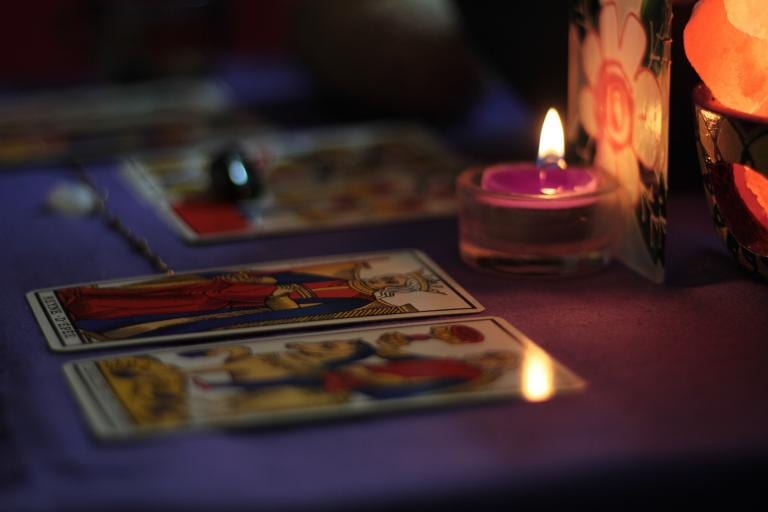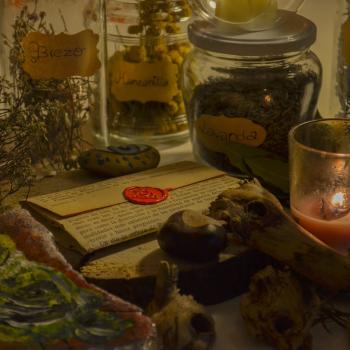So, we all know about the TikTok Witches Hexing the Fae. And while there is a large chance that the situation has been born out of a hoax (for more info check out Scarlet Magdalene or Morgan Daimler’s posts), I thought it might be worth a look at what hexing is and the questions that go along with the topic. What is hexing? Why would a person hex? When would a hex be the course of action to take? How does one hex? And the ultimate question–Should a Witch or other magickal practitioner use a hex?

What Is Hexing?
Brought to the United States by Pennsylvania Germans around the 1800’s, the term “hexe” or “hex” (originating from German –“Hexen”) can be a noun that means “witch” or more generally a verb meaning “to practice witchcraft.”
Other words used for “hex” may include charm (to control/achieve by the use of magick), bewitch (to cast a spell over someone), enchant (to put someone/something under a spell), jinx (a person/object who is used to bring bad luck), or whammy (to use evil or unlucky influences to affect others in a negative way).
By the most standard definition, “hex” or “hexing” implies causing unpleasant, unlucky, or harmful things to happen to people (or their stuff) through supernatural means by use of witchcraft. I suggest this is a narrow view of “hex” posited by a Christian overculture. But for the benefit of the majority and this post, I will address hexing as being “baneful magick.”

Why and When Would A Person Hex?
I’ve decided to combine “why and when” a Witch or magickal practitioner might cast a hexing spell because they correspond.
In regard to these questions, a few years ago, my family and I shared a short, live broadcast from Detroit ConjureFest. We attended classes and reported about the goings-on. One of the classes I went to covered “cursing and crossing“, taught by a HooDoo practitioner who wrote a “how-to” book on the subject.
Let me tell you, the information was thorough and intense. The practitioner teaching the class made a point of listing reasons why you do not curse (or for the purposes of this post–hex) in length before getting into the how to do it. Because in her view (and mine) a Witch or other magickal practitioner should never set out to “hex” someone without a damn good reason.
I’ve written on the topic of baneful magick and we’ve discussed cursing on 3 Pagans and a Cat Podcast. The question in this section is –Why would someone cast what might be considered an unlucky, harmful, or baneful spell?
As with any spell, there are a variety of reasons a person might hex:
Political — A prime example is the “Bind Trump” spells that have been in action since 2016. A magickal working I have participated in myself as I believe the man is unfit for the role he occupies. If this raises questions for you, I suggest Starhawk’s views on hexing from her perspective as an activist. While I don’t follow the Law of Three (as I’m not Wiccan), Starhawk is an Elder in the Pagan community with much wisdom to share.
Magickal Resistance — Where there is an acute need for social change/reform. For dealing with patriarchal disparities, fascism, white supremacy, racism, etc. Related to political.
Justice — When the judicial system fails to protect the innocent or punish the guilty and no other recourse is left for the victim or their family.
Personal Grievances — This is the scenario most people think of when it comes to hexing (or any kind of baneful magick). Retribution or manipulation in regard to unfaithful lovers, annoying or combative neighbors, those who mean to cause harm to one’s self, family, etc.

How Might A Witch/Magickal Practitioner Hex?
This comes down to knowledge of spellcraft. And I will state my personal belief that hexing is not something for the beginner or faint of heart. However, there are a variety of ways a person might set up a hexing spell. And while preparation is important in all forms of magick, I believe it is doubly so for anyone with a mind to curse someone. This is why it’s important to have (and I will reiterate this) a very good reason to do so.
In my view, hexing (cursing) someone should always be the last resort. But if a Witch or magickal practitioner has examined the situation and deems it necessary then here are a few things to keep in mind:
(The information shared below is adapted from “How To Curse Somone” from Wiki-How, of all places.)
Damn Good Reason: Just so we are clear, to curse or hex someone means you intend to cause some kind of harm –physical/financial/mental/emotional. Working of this nature should be undertaken with the utmost seriousness (as should all spellcraft). This is why the TikTok “curse the fae”, “curse the moon” thing had people so agog. This type of magick is not a joke. Ever.
There Will Be Consequences: A spell of this nature will affect the target’s life as well as those within their sphere of influence. The Witch or magickal practitioner must always be prepared to accept responsibility for the magick that they wield. All of it.
You May Experience Personal BackLash: Some Witches and Wiccans believe in the Law of Three or the Law of Return. Basically, it is a “you reap what you sow” concept in triplicate. The energy you send out returns with three times the intensity. While I do not subscribe to this belief, others do but feel the need for the hex/curse overrides the potential for blowback. Regardless, this falls once more into the “take responsibility for your actions –magickal and otherwise” category.
Emotional Energy Expenditure: It takes a lot of hate, rage, anger (all those types of feelings) to do hexing/cursing work. At least, if you want the spell to be effective and not peter out before it reaches the target. Otherwise, what’s the point? You might as well forgive and forget (and that is an option to remember). Be sure you can hold onto that kind of emotional energy if you choose to do baneful magick.
Use a taglock: Something that identifies/signifies the target of the hex. A lock of hair. A picture. Their full name printed on a piece of paper. Very important. This is to prevent innocent bystanders from getting caught in the crossfire. Although the sphere of influence is a thing so see above – there may still be consequences to others.
Finally, create a focused intention. Gather the materials. The rest is spellcraft. How you choose to do the hex (poppet, jar, bag, candle) is up to you.

Should A Witch/Magickal Practitioner Hex?
In my view, this is a personal decision that must be left to the Witch or magickal practitioner to decide. There are gatekeepers on all sides of the Witchcraft, Pagan, Magickal communities. People will express their opinion but what they believe has no bearing on the individual practice of other Witches and magickal practitioners.
Magick is what it is. Witchcraft is called a practice for a reason. We learn as we go. How a person aligns their worldview is based on choices, experiences, and being open to learning as they travel the path. Ethics in spellcraft (and life for that matter) is on each individual to determine. Having said that, there is something to be said for the collective wisdom of other practitioners, and respecting what Elders have to say even when we may disagree with their conclusions.
Ode and I have both stated that we work magick of all types and this includes baneful when it’s necessary. However, I do think it’s essential to keep at least a few things in mind before deeming a hex/curse might be warranted in a situation:
- Wait at least one week before throwing any kind of hex/curse. Don’t let hexing/cursing be an immediate response. Being pissed off is not a “damn good reason.” Make sure your anger is justified. Reassess the situation after you have calmed down.
- Determine if there is a mundane solution (negotiate with the neighbor, call the police, get a restraining order, engage a mediator to resolve conflict, report the boss/coworker).
- Make sure shadow-work is a part of your spiritual practice. Why? As mentioned, it takes “big energy” to activate a curse or hex. Shadow-work will help you be able to determine if the emotional investment is worth it. Also, that type of energy is “sticky.” You may need to deal with it in the aftermath of the work. Because doing harm to others can hurt you to do even if your action is justified.
- Remember the basics. Ground, center, and cleanse after doing any kind of baneful magick.

For me, to be a Witch is a recognition of who I am down to marrow and blood. It is to embrace that part within me connected to nature. And it is to take responsibility for the intentions that I send out into the world through spellcraft and witchery.
Hexing is to practice witchcraft. As indeed all forms of magick are regardless of how the intention or mechanics have been categorized over the generations as “light”, “dark”, “good”, “evil.”
I’ve heard it said to be a Witch is to have the power to harm or heal within. I believe this to be true. How we choose to use that power is down to us.

















